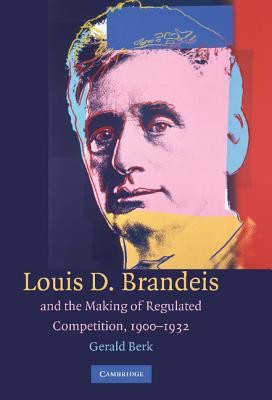
- We will send in 10–14 business days.
- Author: Gerald Berk
- Publisher: Cambridge University Press
- ISBN-10: 0521425964
- ISBN-13: 9780521425964
- Format: 15 x 22.6 x 2.8 cm, hardcover
- Language: English
- SAVE -10% with code: EXTRA
Louis D. Brandeis and the Making of Regulated Competition, 1900-1932 (e-book) (used book) | bookbook.eu
Reviews
Description
This book provides an innovative interpretation of industrialization and statebuilding in the United States. Whereas most scholars cast the politics of industrialization in the progressive era as a narrow choice between breaking up and regulating the large corporation, Berk reveals a third way: regulated competition. In this framework, the government steered economic development away from concentrated power by channeling competition from predation to improvements in products and production processes. Louis Brandeis conceptualized regulated competition and introduced it into public debate. Political entrepreneurs in Congress enacted many of Brandeis's proposals into law. The Federal Trade Commission enlisted business and professional associations to make it workable. The commercial printing industry showed how it could succeed. And 30 percent of manufacturing industries used it to improve economic performance. In order to make sense of regulated competition, Berk provides a new theory of institutions he calls "creative syncretism," which stresses the recombinability of institutional parts and the creativity of actors.
EXTRA 10 % discount with code: EXTRA
The promotion ends in 18d.11:04:14
The discount code is valid when purchasing from 10 €. Discounts do not stack.
- Author: Gerald Berk
- Publisher: Cambridge University Press
- ISBN-10: 0521425964
- ISBN-13: 9780521425964
- Format: 15 x 22.6 x 2.8 cm, hardcover
- Language: English English
This book provides an innovative interpretation of industrialization and statebuilding in the United States. Whereas most scholars cast the politics of industrialization in the progressive era as a narrow choice between breaking up and regulating the large corporation, Berk reveals a third way: regulated competition. In this framework, the government steered economic development away from concentrated power by channeling competition from predation to improvements in products and production processes. Louis Brandeis conceptualized regulated competition and introduced it into public debate. Political entrepreneurs in Congress enacted many of Brandeis's proposals into law. The Federal Trade Commission enlisted business and professional associations to make it workable. The commercial printing industry showed how it could succeed. And 30 percent of manufacturing industries used it to improve economic performance. In order to make sense of regulated competition, Berk provides a new theory of institutions he calls "creative syncretism," which stresses the recombinability of institutional parts and the creativity of actors.


Reviews